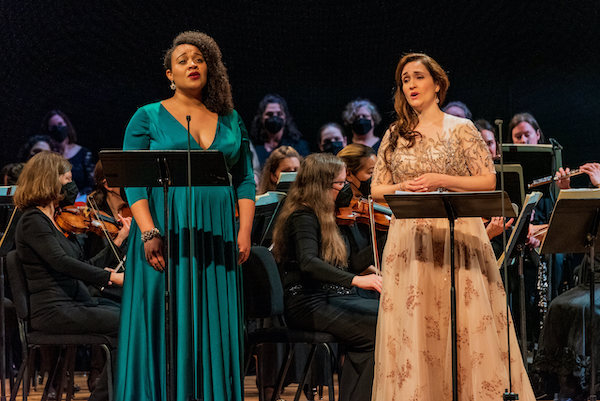Erin Morley soars in Washington Concert Opera’s superb “Lakmé”

Taylor Raven as Mallika and Erin Morley in the title role of Delibes’ Lakmé, presented by Washington Concert Opera. Photo: Caitlin Oldham
If Washingtonians hear an operatic rarity, like Lakmé by Léo Delibes, it is most likely thanks to Washington Concert Opera. This company, whose greatest virtue is going far afield, was the last to mount a performance of this exotic curiosity in the capital city, back in 1989.
On Sunday night at Lisner Auditorium, artistic director Antony Walker showed again that this opera does not deserve the obscurity into which it has fallen.
Granted, the libretto, by Edmond Gondinet and Philippe Gille, was seen as less objectionable in the colonial era from which it emerged. The story was derived partially from the novel Le Mariage de Loti, loosely based on Pierre Loti’s sexual tourism experiences as a naval officer in Tahiti. In the opera an Army officer seduces a young woman, the daughter of a Brahmin priest, and drives her to suicide, in British-ruled India around the time of the opera’s premiere in 1883.
Like another opera inspired by Loti’s work, Puccini’s Madama Butterfly, the setting provides many opportunities for exotic musical tableaux. A British Army officer, Gérald, falls in love with Lakmé, a mysterious Indian girl with a talent for singing religious tales, because she is distant and unknowable. Lakmé betrays her father’s wishes and her religious devotion to marry Gérald in a mystical ceremony, before Gérald comes to his senses and returns to his British fiancée.
Soprano Erin Morley triumphed as Lakmé Sunday in her WCO debut. Washington listeners may remember her young artist roles at Wolf Trap Opera Company in the 2000’s, including a fizzy Zerbinetta. Her coloratura technique has become even more impressive since the Nightingale in Stravinsky’s Le Rossignol at Santa Fe Opera. Every moment she sang, onstage and from the wings, her voice shimmered with radiance and delicacy.
The character’s big showpiece, “L’Air des Clochettes” (or “Bell Song”) in Act II, was a tour de force. Morley set the stage with ravishing unaccompanied flourishes in the opening cadenza. Her crystalline staccato notes, perfectly tuned and placed up to high B and C#, answered in dialogue to the glockenspiel and harp. She added all the optional ornamentation off the top of the staff and then some, even going up to a stratospheric G# at the end of the first verse, and then ending on a long, exquisitely sung high E.
Lakmé’s other major solo, the berceuse “Sous le ciel tout étoilé,” opens Act III, when Lakmé has rescued Gérald after her father attempted to assassinate him. It featured Morley’s luxuriant legato singing and her gleaming pianissimo tone, as well as ending powerfully on the optional high C final note. She was dramatically so believable, a vocal portrait of such innocence and mystery that audience members were as bewitched as Gérald.
She was seconded in the opera’s other famous excerpt, the “Flower Duet” (“Sous le dôme épais”) from Act I, by another noteworthy Wolf Trap alumna, the puissant mezzo-soprano Taylor Raven as Mallika, Lakmé’s servant. Her warm tone on the lower part, purring but present, allowed Morley to float the top part above with consummate ease. This lilting tune becomes a leitmotif, heard in the orchestra almost every time Lakmé is mentioned but not present on the stage.
Alfred Walker deployed his stentorian bass-baritone to the angry role of Nilakantha, Lakmé’s father. In the late 19th century, the bloodthirstiness of the character likely seemed more hateful vengeance than righteous indignation, as it does now. Walker snarled and howled with resentment one can only describe as justified, seeing his country occupied, his religious practices banned, and his daughter wooed away by a foreigner.
Tenor Frédéric Antoun had a slightly off night, with some notes almost cracking and a few intonation issues. This is, however, a voice with pleasing characteristics, including ringing top notes and the ability to shape lines with musical sensitivity. In the duets with Lakmé, where he did not have to be as much in the limelight, he had the best results.
As usual, Antony Walker assembled an extraordinary cast down into the supporting roles. The colonial quintet of British expats, including Antoun, sang with sparkle and rhythmic unity, pieces of Offenbach-level musical wit and a reminder of Delibes’s early work in opéra-comique. The Miss Ellen of soprano Véronique Filloux, Gérald’s fiancée, crowned these ensembles with incisive high notes.
The banter of this group of clueless tourists received comic vitality from Miss Ellen’s sister, the Miss Rose of confident mezzo-soprano Lindsay Metzger. Their supercilious governess, Mistress Bentson, was sung with imperious lack of awareness by remarkable contralto Megan Esther Grey. This was also a strong outing for baritone Theo Hoffman, whose tightly coiled vibrato gave a resonant buzz to the role of Frédéric, Gérald’s fellow officer. Chorister Sammy Huh made a charmingly self-effacing Hadji, Lakmé’s childhood friend who helps her save Gérald’s life.
Walker conducted the score with confident efficiency, coordinating the offstage contributions of soloists and, in Act III, the chorus, the latter well prepared by assistant conductor David Hanlon. Choral chanting scenes were heightened by touches of exotic percussion and folksy drones in the lower strings and brass. Harpist Eric Sabatino added an aura of mystery to many of Lakmé’s pieces, including her first entrance, where she sang from off stage.
Other atmospheric instrumental contributions came from concertmaster Sally McLain and especially the two impeccable piccolo players, Kathryn Farenish and Ellen Dooley, who added flavor to the bazaar scene in Act II and to the sounds of the mustering Army unit in Act III. Even with the ballet music cut from Act II, when religious dancers appear after the closing of the bazaar, the evening ran to over three hours with two intermissions.
Washington Concert Opera will present two complete operas in 2022-23: Donizetti’s Roberto Devereux (December 4, 2022) and Verdi’s Macbeth (March 3, 2023). Subscriptions will go on sale soon. concertopera.org


